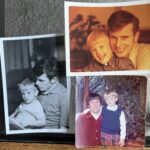Writing “The Dis”
By the time we are thirty years old, we know it’s true: all our abilities are temporary. Our physical and cognitive skills decline, at an ever-increasing pace, as if with a will of their own.
For the first few decades of our lives, most of us follow an upward trajectory on the mountain of life; we climb, blissfully unaware of the injuries accruing in every cell of our bodies. We smile into the pure, trickling streams of water beside the ascending trails, and we marvel at the reflection of the nearly cloudless morning sky.
Then, one day, while hiking, watching the birds, and whistling, we step upon a few loose pebbles, slip down an embankment, and slide over a precipice. While falling, we meet for the first time the undisguised face of gravity, the creature behind the howls in the night. We meet the wolf. It snaps at us and snarls as we plummet, its razor teeth flashing in the morning light, blinding us even as we fall. Blood drips wet from its chin and splashes crimson upon the ground below.
Do you remember the first time your head smacked and broke upon the unforgiving ground? Can you recall the day you first met the wolf, and it breathed its fire upon your neck?
Dis-ability is the course of life. All the snow upon every mountain melts at last; every raindrop runs by its own course to the rivers and the lakes below; and human life ends in total disability.
If there is resurrection after death—and I say “if” not because my Hope is so small but because every reader must come to their own conclusions—then there will be a day of renewal. Perhaps we will receive fresh abilities after death, talents unknown, in a transformed body, on a new earth equivalent. Perhaps those skills will be parceled out to us one at a time, so we can appreciate each one properly.
But this is now.
My Uncle Thomas Thompson earned a PhD in theology. To get his doctoral degree, he had to complete a “dissertation.” He was always thinking about the dissertation, always talking about the giant project. Eventually, the grand work acquired a name of its own: “The Dis.”
April 11-13, 2024, I attended the Calvin University Festival of Faith and Writing, a marvelous gathering of thousands of writers. Amy Julia Becker spoke of the importance of including characters with disability in our writing. (Amy has a daughter with Down Syndrome, and empowered by this experience, she hosts a podcast titled Reimagining the Good Life.)
Becker says it was only in the 1990s, in the US, that children with disabilities began to get mainstreamed with other kids and finally included in the photos of life. Modern society tends to tell two false stories of disability. The “tragic story” is shown in the 2016 movie Me Before You, which lauds euthanasia. The “inspiration story,” by contrast, is an overly happy approach—celebrating how those with difficulties teach everyone else to overcome. Paradoxically, the inspiration focus, arguably, is still centered on those without disability.
A few famous movies and books have explored select physical ailments in a fair light. Wonder, for example, shows a severe facial malformation (Treacher Collins syndrome) in a healthy way; Out of My Mind is about cerebral palsy; and Fish in a Tree examines dyslexia. Unfortunately, the works of art that graciously incorporate cognitively impaired people seem to be rarer still.
The disability in my medical office conforms to no overarching age, race, or gender pattern. I have fifty-year-olds with Alzheimer’s Disease and Down Syndrome. They need to hear good stories, simply told, with characters like themselves, but which books can they appreciate? I have thirty-year-olds with muscular dystrophy or multiple sclerosis who can hardly walk and twenty-year-olds with schizophrenia or blindness from their diabetes. Where are the audiobooks that speak with their voices?
In the Thompson fantasy series, yet to be published, starting with Journey to Crumble’s End: The Legend Begins, I incorporate many elements of chronic pain because I experience fibromyalgia. I hope to let people who suffer from this disability find delight when characters like themselves save the day.
Here’s where I need your help. Beginning with Book III, my Juliet and Romeo characters, Chalan and Diasic, become the mother and father of a new people. They have twelve daughters, the mothers of twelve tribes. It’s a Sarai and Abram story with roles reversed. The Sarai character is just as important as the Abram figure, and womanhood is celebrated even more than manhood.
What disabilities shall I choose for these twelve daughters? I need not afflict them all—two or three will do. In the Stone Age, running matters, so I’m thinking about having one of the twelve be born without feet. I won’t glamorize her hardship, but I will find some way for her to triumph where others do not. Similarly, I’d like to give one of these daughters a substantial cognitive disorder—and then reveal her humanity in a memorable, nuanced way that has never been done before. What disability shall I choose?
Please leave your comments below on what you think needs to be better represented in literature. Remember, I’m writing in the Stone Age. Thank you for helping me with this grand project. Together, we’re writing “The Dis.”
Check out Amy Julia Becker’s Podcast: https://amyjuliabecker.com/podcast/
If you liked this post, please send it to a friend. If the reading audience grows, agents and publishers become suddenly far more keen on joining in the Adventures of TAT!
Copy URL to Clipboard





